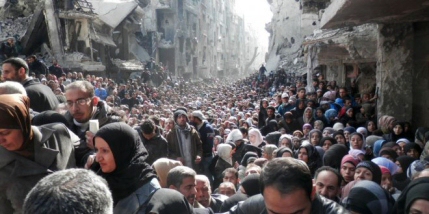Palestinian refugees from Syria are amongst the most vulnerable refugees who seek safety in Europe. But, the legal framework that is being applied to their plight is a discriminatory one.The majority of Palestinians in Syria were forced to resettle there, after fleeing or being forcibly expelled from their homes during the 1948 Nakba, or ‘catastrophe’. In 2014, an issue of Al-Majdal, the Badil Resource Center for Palestinian Residency and Refugee Rights’ magazine, characterizes the current situation of Palestinian refugees leaving Syria as a component of the “ongoing Nakba”. Of the 560,000 Palestinian refugees registered in Syria, according to UNWRA, “up to 280,000 are currently displaced inside Syria, with a further 80,000 displaced to neighboring countries including Lebanon, Jordan, Turkey, Egypt and, increasingly, to Europe.” The new generation of Palestinians are now again being displaced, this time forced to venture even further away from home.
Palestinian refugees who fled to Syria, due to the terrifying situation in their homeland, are now desperate for another option. For many, by far, their best bet is Europe. But, the few Western countries that have opened channels for Syrians to enter legally are almost always unavailable to Palestinians, because they do not hold Syrian passports. For many, the only hope for a safer and more stable future is to attempt the dangerous journey to enter Europe in secret — along with thousands of refugees who have had to join the dangerous rubber boat journeys to Europe, in hope of a safe and better life.
Ziad al-Aloul, the head of the Palestinian Forum in Europe, announced in September of last year that almost 100,000 Palestinians from Syria have attempted to flee to Europe and, sadly, at least one thousand have drowned on their journey.
Aloul told the Al-Resalah online newspaper that some 500,000 Palestinians have fled from Palestinian refugee camps in Syria, and more than 200,000 of them are stateless and currently residing in Europe. The exact number of Palestinian refugees in Europe is unknown.
What happens to those who reach Europe?
According to the Institute for Palestine Studies, they often remain without legal status, at first. Those who have family members in Europe may have an easier time attaining residency, but even many of those with family networks must find a way through the bureaucratic hell which characterizes both asylum and family reunification procedures.
Greece and other European countries have created a special refugee status whereby Syrians may apply for and receive political asylum on the same day, but, for Palestinians, the process can be much more difficult because they do not have Syrian nationality. According to Professor Susan Akram, director of Boston University Law’s International Human Rights Clinic, there is considerable confusion and conflicting interpretations, within and among European states, about the status of Palestinian refugees living in Europe under the 1951 Convention Relating to the Status of Refugees. Most European countries either do not recognize or incorporate Article 1D of the 1951 Refugee Convention into domestic law, or interpret the article incorrectly, which cites:
“This Convention shall not apply to persons who are at present receiving from organs or agencies of the United Nations other than the United Nations High Commissioner for Refugees protection or assistance.”
So, while Palestine receives support and protection from organs such as the UN, displaced Palestinians may not receive this support:
“This excludes from the benefits of the 1951 Convention those Palestinians who are refugees as a result of the 1948 or 1967 Arab/Israeli conflicts, and who are receiving protection or assistance from the United Nations Relief and Works Agency for Palestine Refugees in the Near East (UNRWA)”. “While paragraph 1 of Article 1D is in effect an exclusion clause, this does not mean that certain groups of Palestinian refugees can never benefit from the protection of the 1951 Convention.”
The conclusion of the Convention is rather unclear:
“The position of Palestinian refugees under international refugee law is complex and continues to evolve. This Note clarifies some pertinent aspects of the position of such refugees and is intended to serve as guidance for use in refugee status determination.”
According to Badil, this means, practically, that Palestinian refugees in Europe are placed outside of the international protection system for refugees worldwide. Palestinian refugees often face difficulties when they apply for asylum, residence based on family reunification, employment, etc.
“Palestinian refugees are facing their most severe situation since 1948. They have had 50 years of occupation, nine years of a blockade in Gaza and, now, five years of conflict in Syria. When you look at all of that, how much more can they absorb?” asks UNRWA Commissioner General Pierre Krähenbühl.
Another issue, according to Ibrahim Abu-Lughod, lecturer at Birzeit university, are refugees who flee from Lebanon to Europe. They are only given an exit permit and no entry permit by Lebanese authorities. Thus, in case they are denied refugee status in Europe, they cannot return to Lebanon. This creates a legal “No-Man’s Land,” as these refugees no longer have a country to reside in.
So, while Western governments struggle to process refugees pouring over their borders, it is sad remembering that Palestinian refugees could have been resettled on their land a long time ago, if only the international community held the Israel state accountable for its expulsion of Palestinians, and forced the government to adhere to the UN resolution giving them the right to return to their homes.
Palestinian refugees fleeing Syria present a painful reminder of the international community’s failure to either assure the right of return or to provide compensation and viable alternatives for Palestinians refugees. The recent refugee crisis highlights the need to secure justice for the millions of stateless Palestinians around the world.
Archive IMEMC: Israeli Prime Minister Pushes for Control of Golan after Oil Discovery

